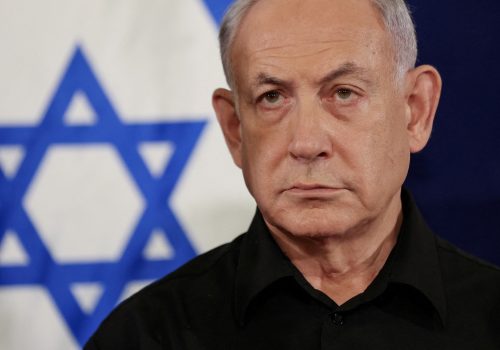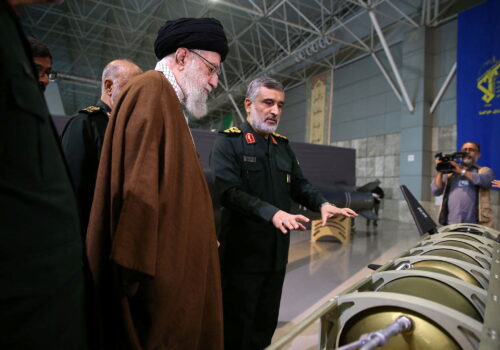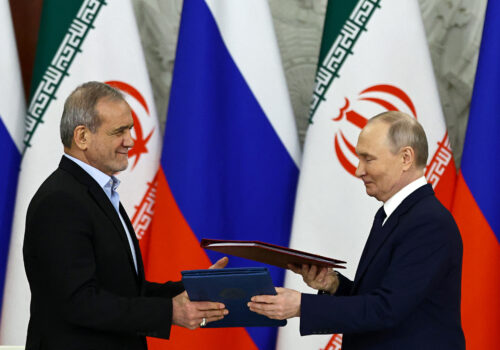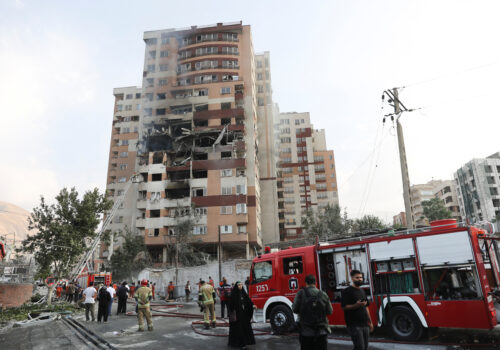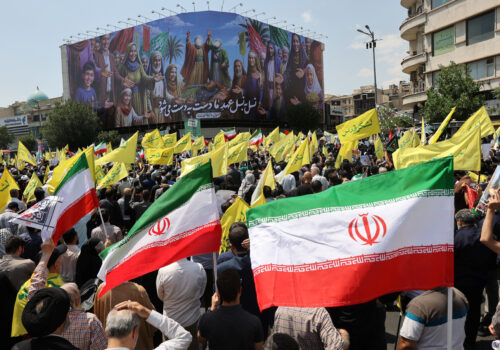Twenty questions (and expert answers) on the Israel-Iran war
A decades-old conflict between Israel and Iran that was never quite “cold” is rapidly heating up. In the days since the first Israeli attacks against the Iranian nuclear program and military leadership, more than two hundred people have been killed in Iran and at least two dozen have died in Israel. The escalating war raises all sorts of questions, from military mechanics to humanitarian efforts to Washington diplomacy and the global energy supply. Below, the Atlantic Council’s authorities on the Middle East unpack this increasingly volatile moment for the region. Read on for expert responses to twenty pressing questions on this emerging war.
1. What was the Israeli calculus in launching Friday’s strikes against Iran?
Israel recognized a golden opportunity to seize Iranian weakness, following the collapse of is proxy “Axis of Resistance” led by Hezbollah along with Israel’s operational achievements of its October 2024 attack on Iran, when Israel destroyed Tehran’s strategic air defense system. The fact that the path to Iran was open to the Israeli Air Force was a significant factor in the decision to launch the attack, especially as Iran was advancing dangerously in its enrichment program. In addition, Israel recently received intelligence that Iran had resumed its “weapons group” activity in pursuit of a nuclear weapon. The combination of a country on the verge of military enrichment and an active weapons group was too dangerous in the eyes of Israel, which sought to exploit the operational window of opportunity and attack Iran as soon as it received the green light from US President Donald Trump.
—Danny Citrinowicz is a nonresident fellow with the Atlantic Council’s Middle East Programs. He previously served for twenty-five years in a variety of command positions units in Israel Defense Intelligence, including as the head of the Iran branch in the Research and Analysis Division.
2. How effective has Israel been in dismantling Iran’s nuclear capabilities?
First, the Israeli operation’s objective was not defined as a complete destruction of Iran’s nuclear program. Even before its Friday attack, it was clear that Israel has a relatively limited ability to destroy nuclear capabilities without active participation from the United States. Israel can, however, significantly delay Iran’s nuclear program (by at least a year), mainly by striking facilities—starting with Natanz—assassinating nuclear scientists who represent a key bottleneck in the program, and damaging additional sites. Nevertheless, without striking the enrichment facility at Fordow, which likely would require US participation, Iran’s nuclear program cannot be destroyed, only significantly delayed.
As for Iran’s willingness to move forward with its nuclear program, the attack may, paradoxically, encourage Iran to break out toward a nuclear weapon. Nevertheless, making such a decision at this time, especially in view of the intensive Israeli Air Force activity over Iran and Israel’s deep intelligence penetration into Iran’s nuclear program, would be extremely dangerous for Iran and might even motivate Washington to directly join the campaign. Therefore, Iran may prefer to avoid a nuclear breakout—at least at this stage—and instead consider this option in the future.
—Raz Zimmt is a senior researcher at the Institute for National Security Studies and the Alliance Center for Iranian Studies at Tel Aviv University. He is also a veteran Iran watcher in the Israeli Defense Forces. Follow him on X: @RZimmt.
3. How forcefully has Tehran responded, and what has the impact been?
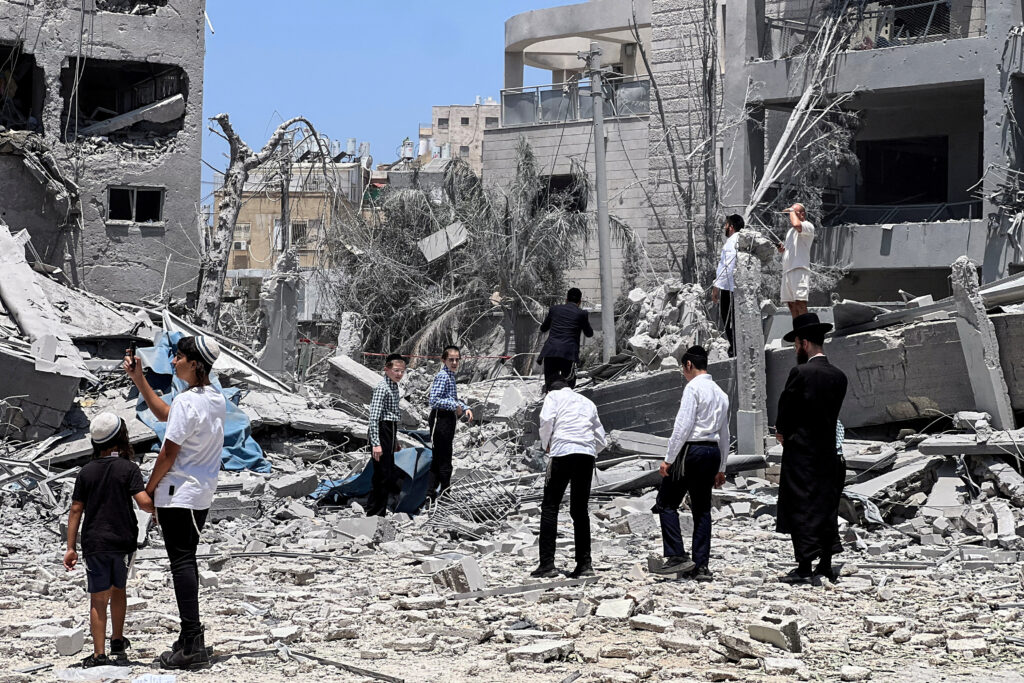
I think we are seeing that Iran’s bark is worse than its bite. Israel’s military and intelligence superiority over the Islamic Republic has overwhelmed and severely weakened the regime through decapitations, degradation of its armed forces, and damage to its nuclear program. Iran cannot compete with the surgical and lethal precision with which Israel is mounting its campaign. Israel’s leadership likely factored in the damage to the home front when making the decision to strike Iran so aggressively, and that speaks to the confidence the Israeli defense establishment has in its ability to manage and counter Iranian retaliation.
The one area I am most concerned about is the prospect of Tehran activating contingency operations targeting Israeli and Jewish interests abroad via terrorism. Iran may also consider targeting the energy interests of US partners in the Arab world as a means of extracting economic pain for these Israeli attacks. Tehran may likewise turn to cyberattacks against critical infrastructure. But in the end, Iran will face supply constraints, and we’re already seeing missiles being lobbed at Israel in more limited quantities, likely to preserve capacity.
—Jason M. Brodsky is the policy director of United Against Nuclear Iran (UANI). His research specialties include Iranian leadership dynamics, Iran’s military and security services, and Iran’s proxy and partner network. He is on X @JasonMBrodsky.
4. What are the the environmental and health concerns from attacks on nuclear facilities?
Attacks on nuclear facilities carry the grave threat of significant impacts on health and the environment. In its June 13 statement following Israel’s launch of strikes on Iran, the International Atomic Energy Agency (IAEA) noted that “at present, the competent Iranian authorities have confirmed that the Natanz enrichment site has been impacted and that there are no elevated radiation levels.” On June 14, the IAEA said there was also no change in offsite radiation at the Esfahan site, where four buildings, including a uranium conversion facility and a fuel plate fabrication plant, had been hit in the attacks from Israel.
—Jennifer T. Gordon is the director of the Nuclear Energy Policy Initiative and the Daniel B. Poneman chair for nuclear energy policy at the Atlantic Council’s Global Energy Center.
5. How has the IAEA responded, and are there restrictions around striking nuclear facilities under international law?
The IAEA has responded to Israel’s attacks on Iranian nuclear sites by reiterating its stance that “nuclear facilities must never be attacked regardless of the context or circumstances.” The IAEA’s General Conference has published resolutions noting that “any armed attack on and threat against nuclear facilities devoted to peaceful purposes constitutes a violation of the principles of the United Nations Charter, international law and the Statute of the Agency.” Whether Iran’s nuclear facilities were devoted solely to peaceful use is unclear, but regardless, attacks against any type of nuclear facility set a dangerous precedent and make it increasingly difficult to pull back from conflict.
—Jennifer T. Gordon
6. How aligned, or not, are Washington and Jerusalem?
Trump’s administration and Israeli Prime Minister Benjamin Netanyahu’s government are closely aligned on goals, but less aligned on means. They both share the goals of wanting to prevent the Islamic Republic from ever having a nuclear weapon. They share the goal of Hamas being permanently removed from power in Gaza, and for Hezbollah to have far less power in Lebanon than it does now.
On means, Trump wanted to avoid war—he wants to be a peace-through-strength president, and he has people talking in one ear about supporting Israel and the other about staying clear of Middle East wars. Netanyahu sees a narrow window to eliminate the Iranian nuclear threat and does not believe that the Iranian regime will ever agree to the kind of deal Trump wants. For Netanyahu, war now was the only option.
The other important dynamic is that both Trump and Netanyahu believe they have a unique destiny to lead their nations at this hour—but both leaders face a public that is deeply divided about the wisdom of their policy choices. Both are gamblers and will double down when they are convinced they are right. It is inconceivable, therefore, that Trump would ever pressure Netanyahu to end the war short of what it will take to assure Israel’s security.
—Thomas S. Warrick is a nonresident senior fellow with the Adrienne Arsht National Security Resilience Initiative in the Scowcroft Center for Strategy and Security and the Scowcroft Middle East Security Initiative in the Middle East Programs at the Atlantic Council.
Related reading
7. Has the conflict tanked the likelihood of achieving a US nuclear deal with Iran?
The nuclear negotiations between the United States and Iran seemed to have reached an impasse prior to the launch of Israeli strikes, with Washington insisting that Iran must give up enrichment and Tehran, including Supreme Leader Ali Khamenei, insisting that Iran would never give this up. The breadth of Israeli military strikes against Iran, spanning key parts of its nuclear infrastructure, senior military officials and nuclear scientists, ballistic missile stockpiles, and more recently energy infrastructure, probably are read in Iran as aimed at regime change, and make it more likely that Tehran will consider a nuclear breakout rather than a compromise in negotiations. That said, Iran may believe it can exploit Trump’s public calls for an end to the fighting and a return to the negotiating table by hinting at concessions that would get the United States to press Israel to stand down, at least temporarily. So a nuclear deal seems remote—but an Iranian negotiating ploy to try to ensure regime survival could be in the cards.
—Alan Pino is a nonresident senior fellow with the Scowcroft Middle East Security Initiative at the Atlantic Council’s Middle East programs and a former US national intelligence officer for the Near East.
Related reading
8. Has Washington’s force posture in the Middle East shifted since Friday, and what does this tell us about potential US involvement?
Since Thursday, the Pentagon has approved significant force posture changes for US Central Command (CENTCOM). These changes include a large deployment of KC-135/KC-46 aerial refueling tankers. Depending on the numbers of tankers involved, this could be one of the largest peacetime tanker movements in history. The USS Harry S. Truman carrier strike group’s deployment was extended in the Middle East. Also, the USS Carl Vinson carrier strike group is moving to the CENTCOM region for overlapping carrier presence. European Command has the USS Thomas Hudner (DDG-116) now repositioned in the Eastern Mediterranean to contribute air defense support to Israel.
These publicly observable movements may not be the only force posture additions in the Middle East. What these changes portend is that the United States is giving itself flexible military options. This means that Washington can contribute to Israel’s operational tempo of attacks through air-to-air refueling. The United States can also increase its ability to respond through any ground-based US Air Force fighters as well as the aircraft from two carrier strike groups. Finally, this means the United States is increasing its defensive presence to contribute to the air defense of Israel.
—Daniel E. Mouton is a nonresident senior fellow at the Scowcroft Middle East Security Initiative of the Atlantic Council’s Middle East Programs. He served on the National Security Council from 2021 to 2023 as the director for defense and political-military policy for the Middle East and North Africa.
9. What does the response of Iran’s regional proxies tell us?
Iran’s regional proxies have been significantly weakened. Hamas has been decimated. Hezbollah has been badly degraded to the point where there have been public reports about its wariness of getting drawn into this conflict between Israel and Iran. Bashar al-Assad’s regime in Syria is gone. The Houthis retain a capability to strike Israel, but are not a strategic threat. The Iraqi Shiite militias also have resources. But the Islamic Republic’s proxy and partner network is a shell of its former self.
—Jason M. Brodsky
10. How could this impact Palestinians in Gaza?
The prevalent fear in Gaza is that an Israel-Iran war will distract from the already significantly dimmed light on the ongoing starvation and slaughter of civilians in the Palestinian enclave. There is also concern that war may lead to even more impunity and an escalation of Israeli bombardment in Gaza. Some people in Gaza that I’ve spoken with are terrified at the level of chaos the Iran strikes could bring—namely, the potential of this conflict spreading further across the region such that it will result in an even more prolonged war inside Gaza. However, some believe, or maybe hope, that this will help at least end this phase of the nightmare, although they don’t really know exactly what an “end” looks like.
—Arwa Damon is a nonresident senior fellow at the Atlantic Council’s Rafik Hariri Center for the Middle East and president and founder of the International Network for Aid, Relief, and Assistance (INARA).
Hamas undoubtedly imagines that an Israeli-Iranian war may strategically relieve some of the pressure on the Islamist group in the Gaza Strip, as the Israeli military reallocates intelligence and kinetic strike capabilities to the new theater.
Still, Israel will likely maintain a steady tempo of bombardment and ground operations against suspected Hamas targets in Gaza, as it has since the initiation of hostilities with Tehran. The new war is unlikely to prove beneficial to Hamas in any tactical or geostrategic way. In fact, in the medium term, Hamas’s regional posture will be further degraded by the weakening of its chief backer and supporter in Tehran.
Many Palestinians in Gaza have been subtly or even openly gloating about Iran’s woes, holding Tehran directly responsible for the destruction of their lives through Hamas and the network of anti-Israel terror organizations that served it. Though it may have limited tactical impact in the near term, the weakening or possible collapse of the Iranian regime will be a positive development for the prospects of Gaza’s rejuvenation and regeneration after the war, as well as peace between Palestinians and Israelis.
—Ahmed Fouad Alkhatib leads Realign For Palestine, an Atlantic Council project that challenges entrenched narratives in the Israel and Palestine discourse.
11. Could this war benefit or harm Russia, and how is Moscow navigating both sides?
Russia could potentially benefit from the Israel-Iran conflict, by US attention and support being redirected from Ukraine to Israel, and by the rise in oil prices which provide Moscow with greater resources to fund its war against Ukraine. If the Israel-Iran conflict ends quickly, though, these benefits may not last long. The recent phone call between Trump and Russian President Vladimir Putin, in which both called for an end to the Israel-Iran conflict, also furthers Putin’s aim of increasing Russian cooperation with Washington despite the war in Ukraine continuing.
But, as some Russian commentators have noted, the Israel-Iran conflict also involves the risk of regime collapse in Iran. Like in Syria, this would mean the downfall of a longstanding government that had cooperated closely with Moscow, and Russia having to compete with others for influence with the new authorities emerging in Iran afterward, whatever they might be. With Russia preoccupied by its war against Ukraine, however, Putin would not be in a strong position to do this.
Thus, while the Israel-Iran conflict provides some benefits to Russia, it also poses serious risks for it as well. Putin’s calls to end the Israel-Iran conflict through diplomatic means, then, undoubtedly reflect what he really wants to see happen. Yet even if the conflict does end through (as Putin wants) joint Russian-American mediation efforts, it could result in Iran being more cooperative with the United States than it has been in the past.
—Mark N. Katz is a nonresident senior fellow at the Atlantic Council, and a professor emeritus of government and politics at the George Mason University Schar School of Policy and Government.
Related reading
12. Could this war benefit or harm China, and how is Beijing navigating both sides?
China condemned Israel’s attack and has called on both sides to de-escalate. Nevertheless, Beijing almost certainly sees an opportunity to promote itself as a responsible actor, and even a potential mediator, in the crisis. A wider, regional conflict would raise China’s risk-to-benefit calculus as it would threaten its regional economic, namely energy, interests. As such, China would welcome Washington reining in Israel and resuming talks with Iran. China will also be quick to amplify US failings, real or not, if the situation deteriorates as part of its broader campaign to undermine the United States’ global position and influence.
—Gabriel “Gabo” Alvarado is a former nonresident senior fellow in the Atlantic Council’s Global China Hub. He currently works at Nisos.
13. What weapons have Israel and Iran deployed so far?
From June 13-16, Israel flew F-35I, F-15I, and F-16 aircraft to conduct hundreds of airstrikes using GBU-28 bunker busters, Rampage missiles, and precision munitions against Iranian nuclear facilities, military leadership, and critical infrastructure. Iran retaliated with hundreds of ballistic missiles from its arsenal. Iran‘s attacks include Fattah hypersonic missiles, Khorramshahr ballistic missiles, and other missiles and Unmanned Aerial Vehicles (UAVs) to target Israel in “Operation Severe Punishment.”
—Daniel E. Mouton
14. What are the nuclear counter-proliferation implications of the conflict?
The counter-proliferation implications of this conflict are noteworthy. The IAEA on June 12 declared Iran non-compliant with Nuclear Proliferation Treaty (NPT) obligations for the first time in twenty years. Iran responded by announcing a third uranium enrichment site and threatening NPT withdrawal. While Israel may have destroyed Natanz’s above-ground enrichment plant, the crisis runs the risk of paradoxically accelerating proliferation risks. If this conflict does not fully eliminate the current and future threat of Iranian proliferation, Iran’s irreversible knowledge of the enrichment cycle means that it can simply rebuild and do so with a greater desire to succeed next time.
—Daniel E. Mouton
15. What Iranian oil and gas facilities has Israel targeted, and does this have an impact on the wider fallout?
Israel appears to have successfully hit two natural gas processing facilities in Phase Fourteen of the South Pars gas field, forcing Iran to suspend operations there. Iran’s natural gas production is consumed domestically due to significant sanctions on exporting natural gas. Israeli strikes also hit a major fuel depot and an oil refinery near Tehran. These are significant hits because Iran’s energy situation was already precarious, with parts of the country experiencing planned blackouts due to electricity shortages. Without consistent access to fuel, Iranians living in Tehran cannot evacuate. If Israel takes out additional domestic energy sites around Iran, the potential for the country to simply fall apart is very high. Without fuel, food cannot be transported to cities. Without electricity and running water, illness will proliferate and people will die.
SIGN UP FOR THIS WEEK IN THE MIDEAST NEWSLETTER
At the same time, Israel has not gone after oil production facilities or Kharg Island, where 90 percent of Iran’s crude oil and condensate exports are loaded onto tankers. This leaves Iran’s role in the global oil market relatively unchanged, keeping China satisfied and oil prices under control. If Israel does attack Iran’s oil production or export sites, the entire paradigm will change. As senior official Javad Larijani recently said, if Iran’s oil facilities are severely damaged, Tehran won’t let any country in the region use its own oil.
—Ellen R. Wald is a nonresident senior fellow with the Atlantic Council Global Energy Center and the president of Transversal Consulting.
16. What is the Strait of Hormuz, and why does it matter if Tehran closes it?
Most oil market watchers think this conflict is a direct threat to the Strait of Hormuz, a very narrow waterway that leads out of the Persian Gulf. Oil tankers loading oil from Iraq, Kuwait, Bahrain, Saudi Arabia, parts of the United Arab Emirates, Qatar, and Iran must pass through this chokepoint to exit the Gulf. Approximately 20 percent of the world’s seaborne crude oil exports travel through the Strait of Hormuz. It is very narrow, rocky, and only deep enough for oil tankers to navigate in certain places. The current traffic patterns for the Strait have ships traveling through Iranian waters to enter and exit the Gulf.
Iran may be able to block ships using ships and missiles launched from the shore, though this would only be temporary as the traffic pattern can be rerouted around Iranian waters. It would take some time, and there would be a period of dislocation during which oil prices would spike, but it could be done. However, Iran will only directly threaten the security of ships in the Persian Gulf if it has nothing to lose. Since Iran continues to export oil and condensate, and needs to continue to do so to fund its operations, it is extremely unlikely that it will take action to hamper or halt any ship traffic into or out of the Persian Gulf.
—Ellen R. Wald
17. What dynamics is the Iranian regime grappling with domestically, and how will this impact the conflict?
At this stage, the Iranian regime appears to be maintaining its unity, resolve, and stability, and is closing ranks in the face of an external threat. The anger of the Iranian public, whose hostility toward the regime is well known, has grown due to the authorities’ failure to provide security and protect their people. Nevertheless, it seems that at this moment, the public’s attitude is influenced largely by images of civilians injured and damage to residential neighborhoods in Tehran from Israeli Air Force attacks. This could contribute (at least for now) to a strengthening of national solidarity and a rally-around-the-flag effect. Nevertheless, the continued Israeli military efforts may, over time, weaken the regime’s security, intelligence, and governmental structures, as well as its ability to deal with internal challenges, which could, in the future, pave the way for undermining its stability.
—Raz Zimmt
18. How is the Iranian public responding?
With the caveat that my sources are limited, I’m seeing a range of responses from the Iranian people. Regime supporters, who are now a small minority, are predictably outraged at Israel and support the Islamic Republic’s retaliatory strikes. Most Iranians at this point oppose their regime, and there’s little love lost for the Islamic Revolutionary Guard Corps (IRGC) leaders whom Israel killed. However, many Iranians are expressing sorrow for the innocent civilians killed in the Israeli strikes, particularly those who died when Israel struck residential apartment buildings in Tehran. For Iranians who lived through the Iran-Iraq War (1980-1988), the strikes have also stirred up traumatic memories of bombs raining down on Tehran during that war.
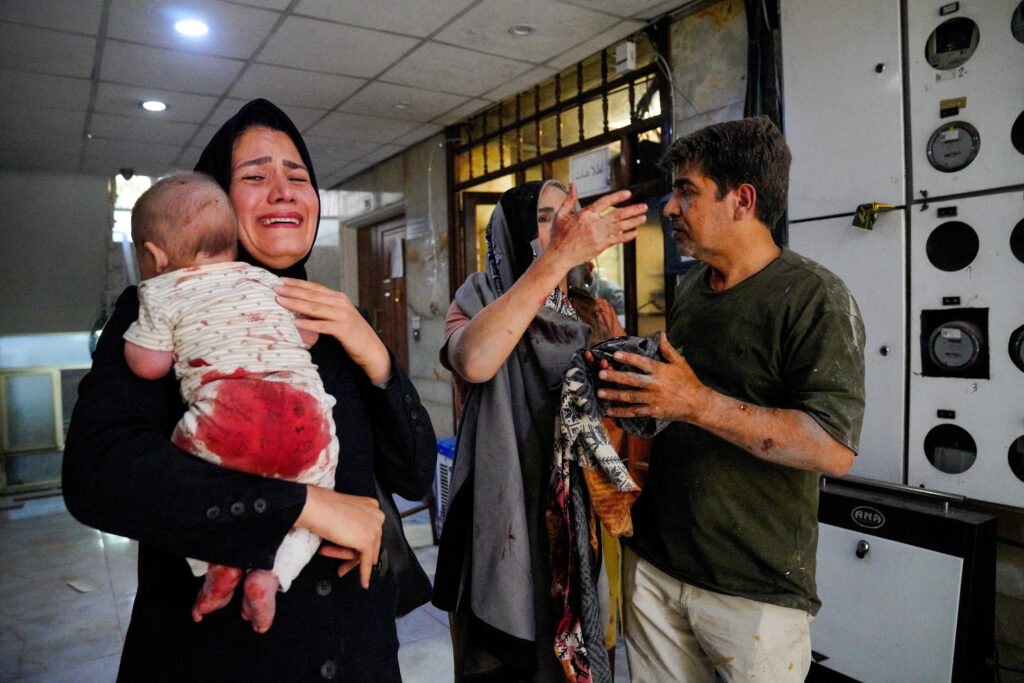
It’s important to note that a lot of Iranians, including those who oppose their government, have complicated feelings about the country’s nuclear program. Many feel that Iran has a right like any other country to have a nuclear program for energy purposes. Yet the idea of developing a nuclear weapon is controversial, with many opposing nuclear weapons for a variety of reasons. The Iranian people also overwhelmingly do not want war. The majority at this point want to see the end of the Islamic Republic and its replacement with a democratic system grounded in human rights and peace.
Mostly, I’ve seen the Iranian people express a lot of anger at their own government for the current situation. They’ve pointed out how there was no warning from the government, no air raid sirens or any other alert, before the Israeli strikes hit. Instead, the strikes hit residential buildings in the early hours of the morning as the people inside slept, oblivious to the danger headed toward them. The public is angry, but not surprised, that the Islamic Republic did not protect its own people. They’ve suffered a lot already, and they are fearful, worried, and angry that many more innocent Iranians are likely to suffer in the conflict to come, especially if things escalate into all-out war.
—Kelly J. Shannon is a historian and visiting scholar at the Institute for Middle East Studies at George Washington University. She is also a member of the Atlantic Council’s Iran Strategy Project Working Group.
19. How is the Israeli public responding?
Most of the Israeli public supports the government’s action and sees the launch of strikes as necessary considering the claims that Iran is dangerously close to a nuclear bomb. Meanwhile the public is giving credit to the government in the campaign, despite the severe casualties on the Israeli home front.
—Danny Citrinowicz
20. Where do we go from here?
Israel’s broad-based assault on Iran’s nuclear and governmental infrastructure and Tehran’s massive missile barrages against Israeli civilians have raised the stakes sky-high for both countries, making it hard to engineer a cease-fire. Israeli officials continue to say that they have many more targets to strike, as they broaden their campaign beyond nuclear installations, top military officials, ballistic missile launch pads, and stockpiles to Iran’s energy infrastructure and government buildings in Tehran.
When asked by an interviewer if Israel is seeking regime change in Iran, Netanyahu said that regime change could be the result of Israel’s actions because “the Iran regime is very weak.” Israel, at a minimum, wants to do enough damage to Iran’s nuclear program that Tehran cannot reconstitute it for the foreseeable future or race to get a nuclear weapon.
Iranian leaders seem to calculate they must continue to show they can inflict punishment on Israel or risk further losing credibility in the eyes of Iranians and perhaps face significant unrest from their population, many of whom have turned against the ruling clerics.
Trump may be the wild card here depending on whether he wants to let the two sides “fight it out,” or if he decides to press Israel to wind down its attacks and Iran to return to nuclear negotiations. Given that a nuclear deal in which Iran gives up enrichment is unlikely, even if a temporary halt to the fighting is achieved, Israel will keep Iran in its crosshairs and conflict between the two countries will dominate Trump’s Middle East agenda for the forseeable future.
—Alan Pino
Further reading
Sat, Jun 14, 2025
Israel’s Iran strike provides a historic chance for Middle East realignment
Inflection Points By Frederick Kempe
History will remember this moment less for the Israeli strikes themselves and more for what follows.
Thu, Jun 12, 2025
Experts react: Israel just attacked Iran’s military and nuclear sites. What’s next?
New Atlanticist By
Our experts shed light on Israel’s major attack against Iran targeting its nuclear facilities and its implications for the region.
Fri, Jun 13, 2025
After Israel’s strikes on Iran, these four questions could determine the Middle East’s future
New Atlanticist By Jonathan Panikoff
The trajectory of the Middle East could be determined by how just a few critical questions are answered the coming days and weeks.
Image: Missiles launched from Iran are intercepted as seen from Tel Aviv, Israel, June 16, 2025. REUTERS/Ronen Zvulun TPX IMAGES OF THE DAY
